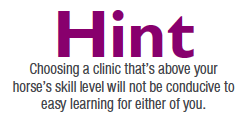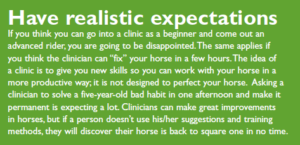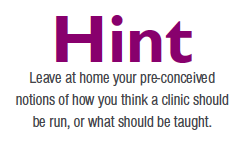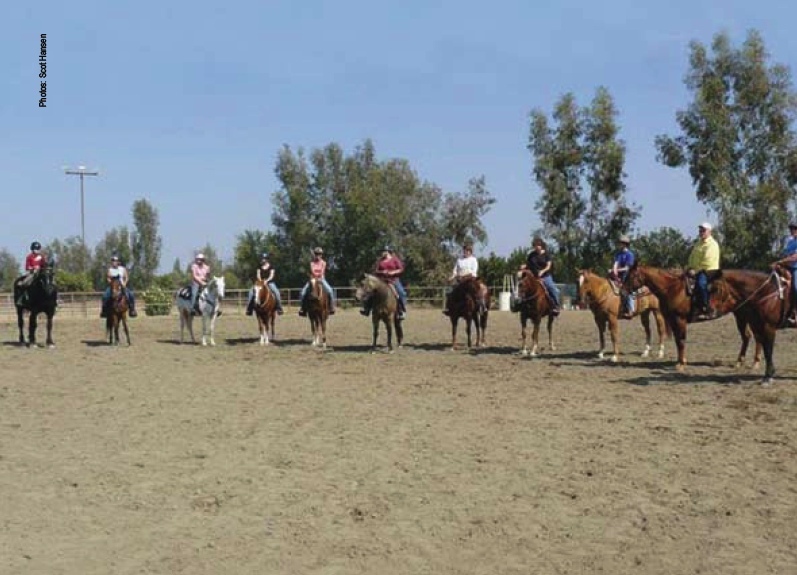A Natural Horsemanship clinic should be an enjoyable learning experience. It will teach you and your horse how to work together in new situations, and you’ll meet some new friends along the way.
These days, there are hundreds of Natural Horsemanship clinics being offered across the country. They are all designed to improve your horsemanship, but before attending a clinic you’ll need to understand a few things, and have a plan in order to get the most out of your experience.
Select the right clinic
First decide which clinician you want to learn from. The most common reason for attending a particular clinic is because a friend recommended it. A better way is to do some research on a variety of different clinics, and then speak to those who have attended them.
Most clinicians will have a section on their website that describes what will be taught during the course. Select the topic that best suits you and your horse, making sure you are not putting your horse in a clinic he isn’t ready for.
 If you are still unsure whether the clinic is right for you, call the clinician or his/ her representative and speak with them, and be honest about your horse’s abilities as well as your own. Also ask how many participants are allowed. A large group means the clinician will not have time to devote individual attention to participants – 14 or less is ideal.
If you are still unsure whether the clinic is right for you, call the clinician or his/ her representative and speak with them, and be honest about your horse’s abilities as well as your own. Also ask how many participants are allowed. A large group means the clinician will not have time to devote individual attention to participants – 14 or less is ideal.
Before attending
Once you have selected a clinic, prepare yourself and your horse by doing a few things in advance.
• Ride your horse prior to the clinic. I know this seems obvious, but you would be surprised at how many people show up at a clinic with horses they haven’t ridden in the previous three to six months.
• Trailer load your horse several times during the week prior to the clinic. Nothing is more stressful than having to fight to get your horse in the trailer on the morning of the clinic, and then arriving late. •Make a list of what to bring and, if possible, pack your trailer ahead of time. Having extra gear is better than not having enough. If you are unsure what equipment you will need, ask the clinician.
• Check your gear and make sure it’s in good shape. Few things are worse than having your cinch break in the middle of a clinic, or your bridle fall apart while riding around the arena.
 On the big day
On the big day
• Make sure you allow lots of time to get ready and arrive at the clinic. If you packed your trailer the night before, use your check list to make sure you have not forgotten anything. Get everything loaded and ready and then load your horse, allowing plenty of time to get him on the trailer. If you do end up running late, call the clinic host and let them know so they are not left worrying and wondering.
• Upon arrival, locate the clinic coordinator and find out where to park and unload. If you are early, find out when you can enter the arena with your horse and what you can do in the meantime. If your horse is spending the night, you may be able to put him in a stall; otherwise he may have to wait in the trailer. Make sure your paperwork is in order and that all forms are signed.
• When you enter the clinic arena, go to a neutral spot and hang out. Do not walk or ride your horse close to a strange horse. No matter how many times I tell people not to let their horses sniff noses, someone will always do it and then is amazed when their horse suddenly squeals and strikes out.
• Listen to the clinician and try everything that he/she is teaching you. It is important to pay close attention when the clinician demonstrates a technique or explains how to do something or why it needs to be done.
Simply try the techniques the way they are explained and see if you and your horse have success. It is also a good idea to watch the clinician when he/she works with someone else’s horse besides your own – sometimes watching from a different angle will help you understand what you need to do to solve an issue with your own horse.
• If the clinician asks you to do something that you feel is beyond your ability, do not be afraid to say something. One of the things I make sure of at my own clinics is that everyone is comfortable with saying, “No, I am not ready for that right now”. It will usually happen during the riding portion, when someone realizes their horse is not as well behaved as they thought he would be, while riding in a large group. As a clinician, it is important to keep people within their comfort zones while getting them to try new things – a scared rider is of no help to an equally scared horse.
 • Try to avoid talking to others in the arena when you should be listening to the clinician. At almost every clinic there is someone who becomes a distraction by chatting. The same can be said of spectators – avoid getting caught up in a conversation, as you are likely to miss some very important points.
• Try to avoid talking to others in the arena when you should be listening to the clinician. At almost every clinic there is someone who becomes a distraction by chatting. The same can be said of spectators – avoid getting caught up in a conversation, as you are likely to miss some very important points.
A Natural Horsemanship clinic should be an enjoyable learning experience. It will teach you and your horse how to work together in new situations, and you’ll meet some new friends along the way. Ride safe and have fun.
Scot Hansen is a retired Mounted Police Officer who travels throughout the U.S. giving clinics and performing at many major Horse Expos. His experience in training police horses is reflected in his horsemanship and sensory training clinics. He created an awardwinning DVD titled Self Defense For Trail Riders that teaches women about safety while riding alone, and has been interviewed on RFD TV and Horse City TV . To see all his training DVD s and clinic schedule, visit www.horsethink.com.








